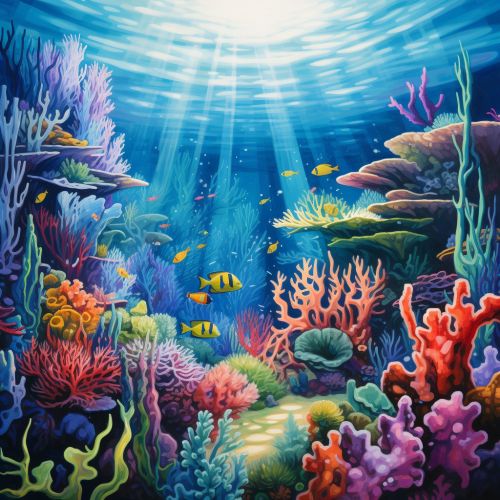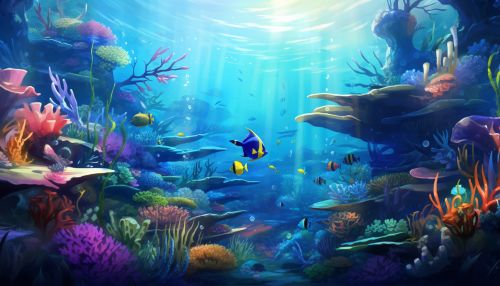Marine Ecosystems
Introduction
Marine ecosystems are among the largest of Earth's aquatic ecosystems. They include oceans, seas, and bays, and are filled with a multitude of different species. These ecosystems are very important for the overall health of both marine and terrestrial environments. They cover approximately 71% of the Earth's surface and contain approximately 97% of the planet's water.
Types of Marine Ecosystems
Marine ecosystems can be divided into many zones depending upon water depth and shoreline features. The oceanic zone is the vast open part of the ocean where animals such as whales, sharks, and tuna live. The benthic zone consists of substrates below water where many invertebrates live. The intertidal zone is where the sea meets the land. Here, you can find tide pools and salt marshes.
Open Ocean
The open ocean, also known as the pelagic zone, is the area of the ocean outside of coastal areas. Here, the water is much deeper, often reaching great depths. The open ocean is teeming with life, from tiny plankton to the largest creature on Earth, the blue whale.
Coral Reefs
Coral reefs are some of the most diverse ecosystems in the world. They are home to a variety of different species, including fish, invertebrates, and plants. Coral reefs are also very important for the health of the planet, as they provide a home for many species, and also help to regulate the amount of carbon dioxide in the atmosphere.
Estuaries
Estuaries are areas where freshwater from rivers or streams meets the salt water of the sea. These areas are incredibly productive and are home to many different species. Estuaries also serve as nurseries for many species of fish and invertebrates.
Importance of Marine Ecosystems
Marine ecosystems are crucial for the overall health of the planet. They regulate the Earth's climate, are a significant source of nutrition, and have economic importance.
Climate Regulation
Marine ecosystems play a vital role in the regulation of the Earth's climate. The ocean absorbs a significant amount of the heat and carbon dioxide produced by human activities, helping to regulate the Earth's temperature and climate.
Nutrition
Marine ecosystems provide a significant source of food for people all over the world. Fish, shellfish, and other seafood are a major source of protein for many people.
Economic Importance
Marine ecosystems also have significant economic importance. They provide a source of income for millions of people who rely on fishing, tourism, and other marine-related industries for their livelihoods.
Threats to Marine Ecosystems
Despite their importance, marine ecosystems are facing numerous threats. These include overfishing, pollution, climate change, and habitat destruction.
Overfishing
Overfishing is a significant threat to marine ecosystems. It can lead to the depletion of fish stocks, which can have a devastating impact on marine ecosystems.
Pollution
Pollution is another major threat to marine ecosystems. This can come in the form of plastic waste, oil spills, and chemicals, all of which can have a devastating impact on marine life.
Climate Change
Climate change is also a significant threat to marine ecosystems. Rising sea levels, ocean acidification, and increasing temperatures can all have a devastating impact on marine life.
Habitat Destruction
Habitat destruction, such as the destruction of coral reefs and mangrove forests, is another major threat to marine ecosystems. These habitats are crucial for the survival of many species, and their destruction can have a devastating impact on marine biodiversity.
Conservation of Marine Ecosystems
Conservation efforts are crucial to protect marine ecosystems. These can include the establishment of marine protected areas, sustainable fishing practices, and efforts to reduce pollution.
Marine Protected Areas
Marine Protected Areas (MPAs) are areas of the ocean where human activities are more tightly regulated than the surrounding waters. They are a tried and tested method of protecting marine biodiversity.
Sustainable Fishing Practices
Sustainable fishing practices are crucial to protect fish stocks and ensure the long-term viability of marine ecosystems. This can include practices such as catch limits, gear restrictions, and closed seasons.
Reducing Pollution
Efforts to reduce pollution are also crucial for the protection of marine ecosystems. This can include efforts to reduce plastic waste, clean up oil spills, and reduce the use of harmful chemicals.
See Also


